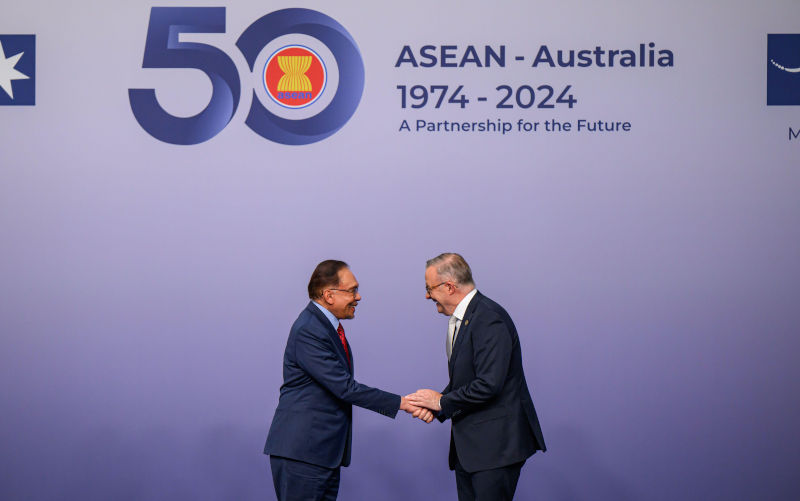ASEAN carpet baggers
March 17, 2024
Without a hint of embarrassment, Australian Treasurer Chalmers declared that ASEAN was ripe for the plucking by Australian business turbocharged by a AUD$2 billion fund.
This is where the action is in ASEAN and we want to get a bigger slice of that action he said.
Addressing 100 chief executives from Australia and south-east Asia, Prime Minister Albanese said he is pursuing the most significant upgrade of Australias economic engagement with ASEAN for a generation.
There was some attempt to cloak this gleeful opportunity to plunder ASEAN as the nations future source of prosperity with some passing words about co-operation but the intent remained clear. ASEAN was a wonderful opportunity for Australian business.
His comments left no room for doubt that Australia believes it has so much to offer ASEAN in terms of green energy. This repeated a refrain often heard in Australia, but it may have come as a surprise to some of the ASEAN participants who have been more closely involved with the truly dramatic advances in green and clean initiatives coming out of China. Australia is struggling with green energy transitions at a time when China is deploying more solar panels in their grid annually than are installed by the rest of the world.
Chalmers comments encouraging a carpet-bagger approach to ASEAN did little to reflect the idea of ASEAN centrality in the decision making of the region.
The tone of some of the Australian media coverage of the meeting gave the impression that one of the ‘A’s in ASEAN stood for Australia.
At times, the commentary appeared to paint those who did not endorse Australian objectives as renegade states within ASEAN. There was little appreciation of the importance of consensus in ASEAN decisions. ASEAN Secretary-General Dr Kao said ASEANs lack of a Big Brother mentality was an asset for the bloc because all members were treated equally regardless of their size, and there was no core group of nations making decisions.
ASEAN decision-making is by consensus, he said. Yes, there may be times it may take a little bit extra time, but once we reach a consensus it is unbreakable. And this is the strength, not a weakness of ASEAN.
Australian Strategic Policy Institute senior analyst Euan Graham disagreed, saying Clearly, Im sceptical of ASEAN diplomacy. Its higher on symbolism than substance.
The address by Foreign Minister Wong also stumbled around the concept of ASEAN centrality and the role played by the global rules-based order. Her speech was all about the importance of the rule-based order. Later she reaffirmed, the importance of ensuring that international law continues to operate and be respected and observed, particularly in the South China Sea and the region.
However, Malaysia and Indonesia, and other countries with significant Muslim populations, could only reflect on Australias silence on the war crimes being committed in Gaza and Wongs rapid suspension, without evidence, of UNRWA funding.
Actions do speak louder than words and Australias lack of strong vocal support in response to the ICJ ruling suggests that the global rules-based order is applied somewhat selectively by Australia. It certainly makes discussions around the role of these rules in the South China Sea more difficult.
We face destabilising, provocative and coercive actions including unsafe conduct at sea and in the air, Wong said in a speech at the security summit, without naming China. Nor did she name Australia and the United States who persist with provocative near-to-shore freedom of navigation exercises that they themselves would not tolerate if undertaken by China close to their shores.
Her comments also begged the question of who are the we she talked about. South east Asia has peacefully coexisted for centuries with China long before Australia and US existed. The long arc of history shows ASEAN influenced socially, culturally and politically by China. It is a foolish rejection of history to suggest this is somehow a new phenomenon and therefore a threat that needs countering by ASEAN.
Malaysian Prime Minster Anwar made the position very clear, saying if Australia and the US have problems with China, they should not impose it upon us.
Both Albanese and Wong referenced the Moore report that supported increased engagement in ASEAN because, in large part, there was money to be made from the growing middle class. The Moore report made scant mention of the Belt and Road Initiative and the role it is playing in ASEAN cooperative development which is perhaps why Australia launched the South-East Asia Investment Financing Facility as if it were a major contribution to the region. The fund is designed to assist Australian business to tap into growing demand for renewable power in the region between now and 2050, so its more about profit than cooperation.
The comments from Australian leaders fell short on the ASEAN concept of cooperation and assistance but were strong in pushing for ASEAN to follow a Western agenda in the region and making room for Australian business to profit from the region.
The concept of ASEAN centrality was paid in lip service to disguise the carpet- baggers approach to regional engagement where Australias interests came first.
